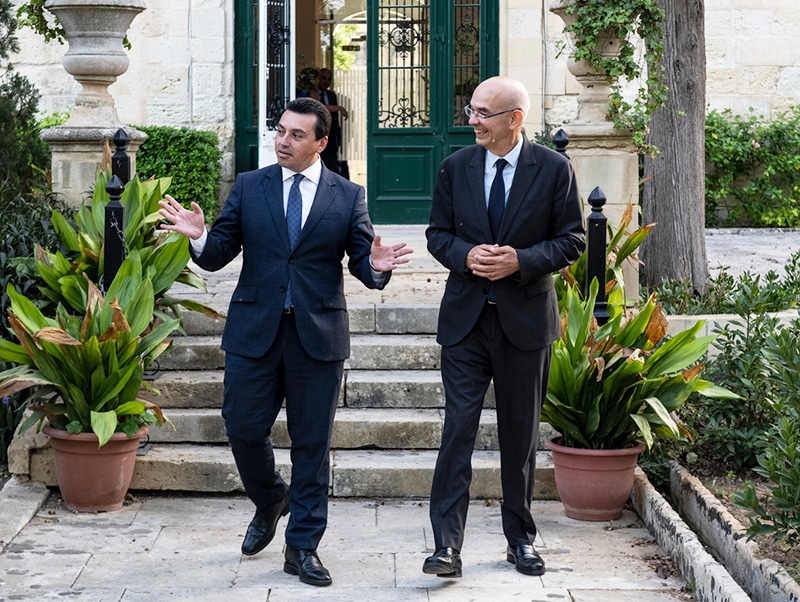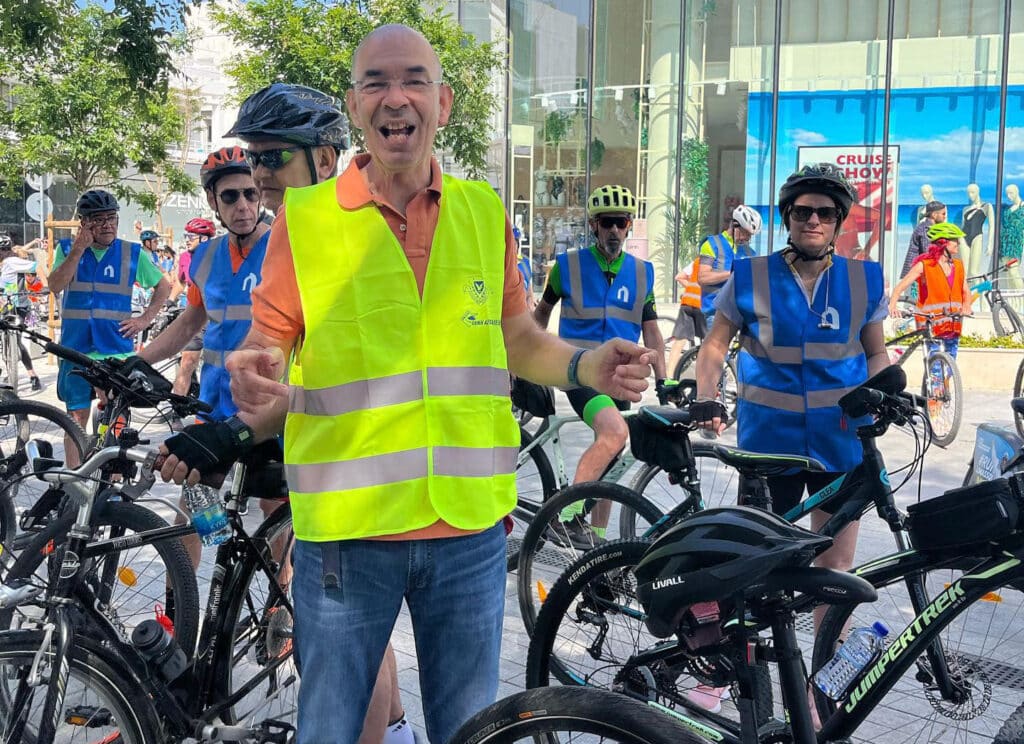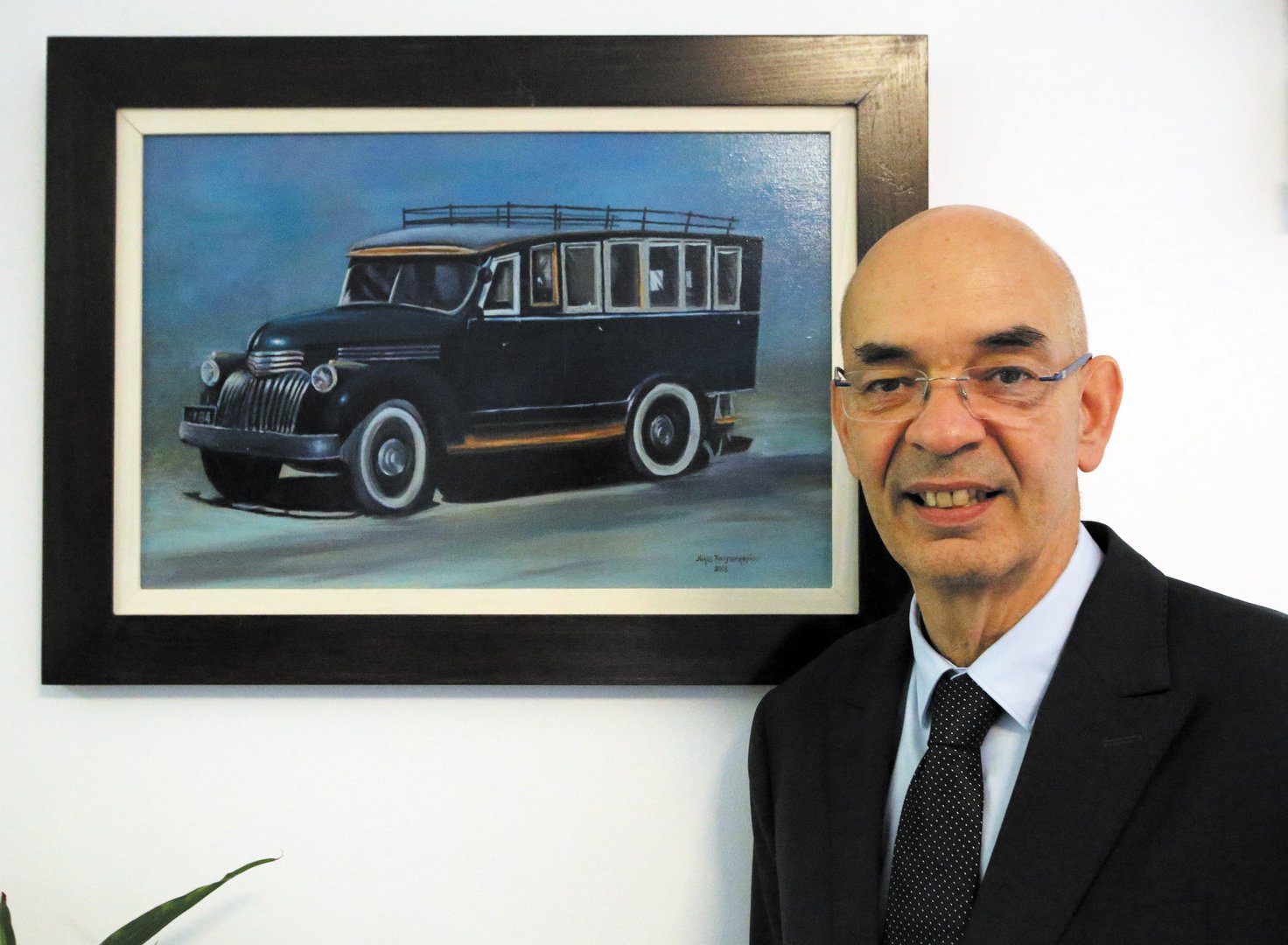From congested streets to turning 60, the transport minister is determined to enjoy life. THEO PANAYIDES finds out how
As I drive back to work from the transport ministry in Nicosia – early afternoon, on a busy Thursday – the usual slow-motion chaos is unfolding. A delivery driver is down at the old Milano lights, and cars are attempting to weave around him. Traffic is chock-a-block all the way up Griva Digeni. There’s the distant honk of a car-horn – just one burst, more in resignation than rage, as though even that driver knew it was hopeless.
Congestion is the big problem, everyone can see that. We have 750,000 cars on the roads in Cyprus, projected to rise to 800,000 by 2030. Back at the transport ministry, though, Alexis Vafeades – the newish Minister of Transport, Communications and Works, having been at the post since the new government was sworn in eight months ago – has bigger problems, or at least a bigger lattice of interconnected problems.
That stray mention of 2030 isn’t incidental. “We have this major target,” he explains in fluent English, “that by 2030 we need to reduce our carbon footprint. Because, you know, almost half of our emissions are coming from transport. We need to reduce today’s emissions by 32 per cent. In seven years. It’s a major, major thing.” This is not some vague campaign promise, it’s an EU initiative, part of the 2030 Agenda – and, though for years we’ve tended to treat the EU as an annoying parent whose rules could be circumvented with a little creative thinking, it’s different now. “If we don’t achieve that,” he goes on, “then we’ll need to be buying green credits – and, if we had to buy green credits for 2020, it would be in the amount of €200 million… €200 million would destroy any budget plans you have about health, about improving education. So it’s non-negotiable.”
This is actually an interesting time for the transport ministry. For years it was a much-loved, uncontroversial ministry that gave people stuff and made their lives easier. It built roads, allowing cars to flourish; it sought to improve road safety, and who could argue with improving road safety? Now, however, for the first time – and it’s unclear how many people are even aware of this – it may soon have to start taking stuff away, and restricting cars in particular. The Cyprus Recovery and Resilience Plan 2021-2026 (another EU initiative, drafted in the aftermath of Covid) explicitly calls for “alternative transport solutions”, and even mentions “measures of a rather drastic character, having to do with restrictions on commuting behaviour and habits,” albeit warning that they could spark resistance unless carefully implemented. Alexis Vafeades may end up having a somewhat rougher ride than his predecessors.

The minister in Malta with his counterpart
The good news is that he can probably handle it – if only because he has nothing to lose. He comes from the private sector, having owned Vafeades & Vafeades (a top architectural practice in Nicosia) for many years – and, though his appointment to the council of ministers came as a shock (“It was not anything that I was pursuing”), he didn’t mind putting his other job on hold for a while when the president called: “I was not,” as he puts it, “at the beginning of my professional career”. I ask how he feels about having turned 60 recently (he’s now 61), and he laughs wryly. Turning 40 was the big one, he muses, that really brought home “the feeling that you’re over the top. 50 was more of a feeling that time is running out – and 60, I think, is a time when you think ‘Let’s enjoy it!’”.
In short, he’s come here to give it his best shot, without preconceptions. He’s also a very smooth interview, delightfully candid and plain-spoken for a politician (probably because he’s only been a politician for about eight months). I even ask about his personality, and he admits – kudos to him for admitting it; humility is almost unheard-of in public figures – that he’s never been what you might call a larger-than-life, life-of-the-party type: “When I compare myself to people who are very, very open, and can entertain and make people feel at home – I don’t have that edge… I’m not really able to entertain people”.
As a young man, he had no special sense of vocation. His mother was from Norway; his dad owned Vafeades & Vafeades, which was why Alexis became an architect in the first place. There was no Plan B – though he did do a physics course while studying in LA, and the prof was so impressed that he suggested changing his major to become a physicist. Alexis seems to have a lucid, pragmatic mind, closer to the sciences than the humanities; even his kids have data-driven, business-minded jobs (he and his wife Evangelia have two children, Maria and Costas, both around 30 and living in London). Even his hobbies – when he still had time for hobbies – were straightforward outdoor pursuits like hiking and cycling; these days his main relaxation is walking his dog Ruby for about an hour, in that little window between the ministry emptying (most people go home around 4-5pm) and the evening engagements that usually keep him busy till around midnight.
When he’s not attending events in the evening, he spends the hours reading. As a minister, he notes, you’re not really expected “to produce work. But you are expected to be informed, and to have an idea of what you want. You need to have an opinion” – hence the need to be aware of all the facts, hence the reading. Mostly, however, he attends events – and meetings, and presentations, a road safety seminar here, a roundtable there, a constant stream of issues and interventions. His Facebook page has a message from a random citizen, asking him to do something about speeding drivers in the village of Pera Pedi. The day before our interview he met with the mayor of Geri in the morning – discussing a bike route that’ll link Geri with the University of Cyprus, allowing students to live cheaply while cycling to class – and heard from disabled people at a roundtable discussion in the evening. After we’re done, he’s off to Paralimni, where the president will be giving a speech on infrastructure projects – and, since he’s going to be there anyway, he’ll meet with the local bus company to inspect their new facilities. It’s all go.

Vafeades at cycling in the city 23 event
The main difference from his job as an architect isn’t the busy schedule (his schedule has always been hectic); it’s the fact that he no longer does any actual problem-solving. “In the private sector you have more of a processing role. You need to spend time on one problem… In the public sector, as a minister, you don’t have time to do things. You have time to decide, and to be informed. That’s all the time you have.” It’s actually the other way round (first you’re informed, then you decide), but I take his point – though there is one important way in which the two jobs are similar. “In my profession,” says Alexis, “what really counts is to persuade people that they can trust you.”
An architect handles their client’s money, in what’s “probably the biggest investment they’ll make in their life”; their job is largely to convince the client that the architect’s ideas are sound, even though it won’t become apparent till the house is actually built. A transport minister, too, handles the public’s money, and his job – especially for this transport minister, at this particular time – is largely to convince the public that his proposals will be beneficial in the long term, even if they seem painful or oppressive in the short term. “I think one of the main tasks at hand is to inform people, give them the big picture. Let them understand what they’re facing, what the challenges are and what the possible solutions are… That’s why we see that pilot projects are very, very important – because they give you a taste of what’s to come.”
The most recent pilot project is ‘Pame Express’ (aka Park & Ride) in Nicosia, aimed at white-collar workers who can now leave their cars and take the bus into town. It started slow, he admits, but it’s now a success, having jumped from 40 passengers on the first day to around 350 cars currently removed from the morning scrum: “I think we [even] left people behind yesterday”. The target isn’t actually congestion, strictly speaking, but pollution; if there were a way to give everyone an electric car, says the minister, that would also be acceptable (even though it’d leave the city just as congested) – but of course “the supply chain cannot provide this… So what’s the other option? To take cars out of the street”. Right now, the challenge is making public transport cheaper and faster than travelling by car – though it’ll always be a “downgrade” in terms of comfort and flexibility – “so that we can start persuading people to leave their car behind”.
All well and good – but two things should perhaps be mentioned. The first is that bringing the bus system up to speed (literally) is quite a challenge. “I tried to see how long it takes to get here by bus, and it takes 20 minutes,” says Alexis, who lives in the centre; “If I walk here, I can also do it in 20 minutes.” The second (and more important) is that pilot projects make attractive carrots – but a stick will almost certainly need to be applied too, as it has for instance in London with Sadiq Khan’s ULEZ charge. “OK, I’ll talk about the stick,” he replies. “Because I think at some point we will need to be changing things even further.”
Replacing cars with buses isn’t really a solution. Just as building more roads always results in more congestion – because it encourages people to drive more, and buy more cars – so reducing traffic at peak times will encourage drivers who previously avoided those hours to venture out, creating new traffic. “Some people say,” he notes carefully, “that the way around this is to take away car privileges”, while also continuing to upgrade public transport. “Reduce available parking. Increase the cost of parking. At some point, try and reduce available lanes…” Reducing the speed limit in residential areas from 30 to 20km/h is also an option. (That’s what they’re doing in Britain, I point out; “That’s what they’re doing everywhere,” he replies.) A law is also being passed that “allows the minister of transport to decide on areas that will be designated as zero per cent pollution, and only electric vehicles can go there” – not for now, of course, but “legislation will be there” at some point in the future, when this is feasible.
These, I assume, are a few of the “drastic” measures in the Recovery and Resilience Plan – though Alexis is at pains to insist that none of this is going to be imposed on anyone. “You have to get the people to want to do it… You’ll first do pilot projects with neighbourhoods that are on board – and once they do it, and once everybody understands the benefit, then you’ll see that more and more people will want to do it.” It’s like road bumps, he says; they too started out as a pilot project (back when Averof Neophytou was transport minister, actually), 20 years later they’re still getting requests to install them. Two neighbourhoods have now volunteered for a new project: taking one lane away from a residential street, turning it into a one-way street, then using the newly created space for a green area. The minister smiles at my surprise: “You can see that across Europe. It’s not a new idea”.
Maybe not – but we in Cyprus always tend to lag behind when it comes to green ideas. What will actually happen, I wonder, if we’re now forced to follow the EU’s more pressing timetable? “You need to have a vision,” says Alexis Vafeades – but our governments have never been great at executing big visions in a timely manner. Will there be political will for these changes – especially if it turns out that people don’t, in fact, want them by 2030?
“Infrastructure is a long-term project,” he shrugs. “We signed a contract the other day, worth €60 million, about bus stops… Marios Demetriades worked on it,” he recalls, listing his predecessors as transport minister, “Vasiliki Anastasiadou worked on it, Yiannis Karousos worked on it – and I signed the contract. So it takes a long time.” All he can do, says this forthright, pragmatic politician – all he really plans to do – is get the ball rolling. “Listen, seven years – I will not be here in seven years, that’s for sure!… What I want to do is put the car on a route to take us somewhere, make sure that the destination is clearly visible, easily understood – and then somebody else will come and do it.” I shake hands and leave him to his next destination (a limo to Paralimni, presumably) then inch my way through the gridlock, hoping that delivery driver isn’t too badly injured.







Click here to change your cookie preferences